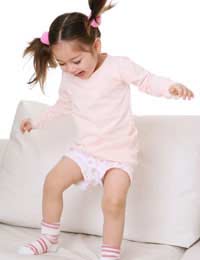Hyperactivity and Diet

It’s a widespread belief that some children become hyperactive when they eat certain foods. Although it’s hard to find scientific studies to back up this theory, many parents and child care experts hold it to be true, with their own experience as evidence.
Isolating the Culprits
It’s often – but not always – artificial ingredients that seem to change children’s behaviour most dramatically. Many parents find that by cutting out processed foods and artificial sweeteners, flavourings and colourings, their children calm down significantly and concentrate better.If, having eliminated artificial ingredients, parents still suspect that something in their child’s diet is making them hyperactive; it’s worth trying to identify the culprit.
The best way to do this is by removing the suspect food altogether for a few days and seeing if it makes any difference. Parents who are considering cutting out a whole food group, like dairy or wheat-based foods, might like to talk with the GP or a dietician to make sure their child continues to eat a healthy, balanced diet. They might also like to get in touch with a support group and swap ideas with other parents about what worked for them.
Sugar and Behaviour
A sugar rush might also be at the bottom of parents’ observations. Sugar gives a boost of instant energy, so if a child starts charging around after having fizzy drinks (note that coke also contains caffeine which is another stimulant) or after eating a chocolate bar, it should help to cut down on these or take them out of the diet altogether.Hyperactive or Just High Spirited?
Some parents (and teachers) see children’s behaviour as hyperactive when it may be little more than bumptiousness. Young children, particularly boys, have a great deal of energy and may struggle to channel it constructively unless they’ve had some exercise. They may also find it difficult to sit still for long periods. It’s easy to think of such children as naughty or hyperactive, when in reality they’re just full of beans and need a chance to let off steam.By all means modify their diets by cutting out additives and sugar and see if it helps. A balanced, healthy diet is highly desirable anyway and if it results in improved concentration at school and calmer behaviour at home, then so much the better. But don’t forget to offer plenty of opportunity for physical activity and outside fun too, which could be just as useful as looking at what they’re eating.
One test of true hyperactivity is whether a child sleeps well. Hyperactive children often find it hard to relax at night, get to sleep and stay asleep. This has knock-on effects the next morning, and the whole thing becomes a vicious circle.


Re: Superfoods on a Budget
I just checked out these fantastic tips for buying superfoods on a budget! Eating healthy doesn’t have to be expensive. Can’t wait to try…
Re: Fun Facts: How Many Calories Does a Child Burn?
hi, im eleven yrs. I weigh about 100 lbs and believe I am over the normal weight. I am about 4’10 ft. I…
Re: Fun Facts: How Many Calories Does a Child Burn?
I want to clear this up for everybody worried about their weight, especially at a young age you shouldn’t…
Re: Dealing with a Child that is Always Hungry
I am the great grandmother of an 8 year old that I mostly take care of her mom is around but she totally depends…
Re: Fun Facts: How Many Calories Does a Child Burn?
I’m 11 years old and recently got a smart watch. This isn’t a big question but I can’t find how many…
Re: Dealing with a Child that is Always Hungry
I'm immediately suspicious of an article that suggests cereal as a healthy snack. Cereal (especially cereal…
Re: Fun Facts: How Many Calories Does a Child Burn?
How many calories SHOULD an average twelve year old burn daily???
Re: Fun Facts: How Many Calories Does a Child Burn?
I'm 9 years old and I'm trying to set up a health journal but I don't know how many calories I should…
Re: Fun Facts: How Many Calories Does a Child Burn?
Hiw much calories should an average 10 year old burn a day?
Re: Dealing with a Child that is Always Hungry
I’m 16 and my sister is 11 years old 57 inches and weighs 90 pounds she only drinks like 2 or 3 16 ounce bottles…